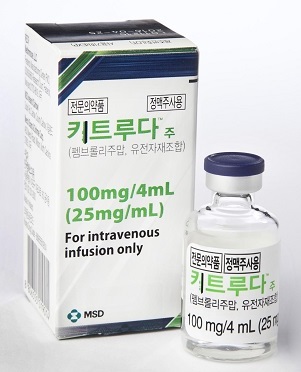The government’s recognition of MSD’s Keytruda (pembrolizumab) for reimbursement as the first-line therapy for lung cancer has accelerated the company’s development of another oncology pipeline built from the backbone of Keytruda.
On Friday, the Ministry of Food and Drug Safety authorized MSD to conduct two phase 3 trials of MK-7684A, a combination drug that contains Keytruda’s ingredient.

MK-7684A is a co-formulation product of pembrolizumab, a monoclonal antibody targeting PD-1, and vivostolimab, a monoclonal antibody targeting TIGIT. In addition, MSD is working on MK-7684A as a follow-up drug of Keytruda in lung cancer.
Keytruda has become the standard of care as the first-line treatment of patients with non-small cell lung cancer (NSCLC) with no EGFR or ALK genomic tumor aberrations.
In Korea, the drug was authorized to be used in metastatic nonsquamous or squamous NSCLC, and as a monotherapy or in combination with chemotherapy, in PD-L1 positive advanced NSCLC.
Despite the marketing approval, Keytruda has not been reimbursable for the first-line treatment of NSCLC. This limited the use of Keytruda in clinical settings.
However, recently, the Health Insurance Review and Assessment Service (HIRA) held a meeting of the Drug Reimbursement Evaluation Committee on Thursday and recognized Keytruda’s eligibility for reimbursement in the first-line therapy of NSCLC for four years after the drug arrived in Korea.
If drug price negotiations go smoothly, Korean lung cancer patients are expected to have insurance benefits in Keytruda treatment.
MSD began developing a follow-up drug as soon as Keytruda became a standard treatment for lung cancer in Korea.
Immune checkpoint inhibitors such as Keytruda usually have a long response duration and excellent therapeutic effect.
However, their response rates are between 20 and 30 percent, with a large unmet need for improvement.
To raise the response rate of immunotherapy, researchers have studied various combination therapies – using them with cytotoxic chemotherapy, angiogenesis inhibitors, and targeted therapies.
What MSD is trying this time is using Keytruda with another immune checkpoint inhibitor. Just like BMS combined anti-PD-1 immunotherapy Opdivo (nivolumab) with anti-CTLA-4 immunotherapy Yervoy (ipilimumab), MSD developed a co-formulation drug mixing Keytruda with vivostolimab that inhibits TIGIT.
The Opdivo plus Yervoy therapy requires separate administration of two different immunotherapies. In contrast, MSD’s MK-7684A contains two monoclonal antibodies Keytruda and vivostolimab, in one solution that can be injectable in a single shot.
In March 2021, MSD obtained the regulatory nod to conduct a phase 3 study to evaluate MK-7684A in the first-line treatment of PD-L1 positive metastatic NSCLC compared to Keytruda monotherapy.
In the following month of April, the company also won the permit to compare MK-7684A alone or KM-7684A plus docetaxel with docetaxel alone in patients with metastatic NSCLC who progressed after treatment with platinum-based two-drug chemotherapy and immunotherapy in a phase 2 trial. The company is recruiting patients.
MSD’s upcoming two phase 3 clinical trials will compare MK-7684A plus chemotherapy with Keytruda plus chemotherapy in the first-line treatment of metastatic NSCLC.

